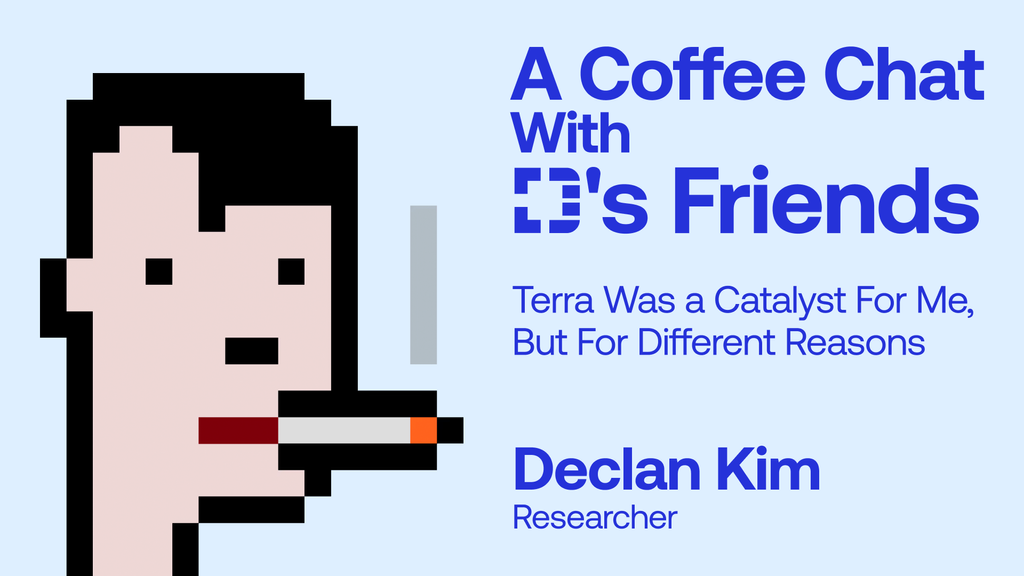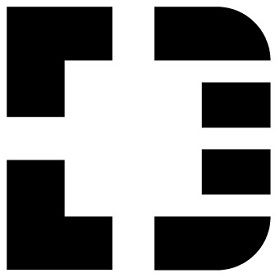
A Coffee Chat With D's Friends I Declan Kim / Researcher
This time, coming up is Declan Kim, Researcher. He will tell us his story about the reason why he entered the Web3 industry and the direction of his research and competitive edge as a researcher.

“Terra Was a Catalyst For Me, But For Different Reasons”
**Disclaimer) The opinions expressed in this interview are those of the interviewer and do not represent the official statement of DeSpread.
Hi, I’m ZZoha, PR Lead at DeSpread. DeSpread is a company of “Degens” who are immersed in the Web3 industry. Each of our coworkers has a unique personality, but we share the same DNA: a genuine love of Web3. We work in a free-spirited atmosphere, but we’re all professionals in our respective fields.
Last time, we interviewed Logan Lee(MoneyStack) Consultant & Contents Producer for our 6th Coffee Chat with D’s Friends, and this time, coming up is Declan Kim, Researcher. He will tell us his story about the reason why he entered the Web3 industry and the direction of his research and competitive edge as a researcher.
ZZo: Could you please introduce yourself?
"I'm Declan Kim, working as a research analyst at DeSpread. I'm also a member of the 10th cohort of the Decipher, the blockchain society at Seoul National University."
ZZo: I understand you're juggling school and work. What prompted you to enter the Web3 industry before graduating?
"Ironically, the Terra incident in May last year sparked my interest in the Web3 industry. While scraping through economic news every morning, I came across the Terra incident in a financial magazine. I was vaguely aware of crypto like Bitcoin and Ethereum, but the fact that a specific crypto suffered consecutive -99% losses over several days piqued my curiosity.
When I asked a friend who was the head of Decipher about Web3, he responded that there's a significant position to be secured if you work hard in this emerging industry. After reading the Bitcoin whitepaper, keeping up with the news, and attending the Korea Blockchain Week(KBW) last year, my perspective on crypto changed. Initially, I considered crypto as mere speculation, but after studying, I realized that crypto and blockchain are promising technologies.
There were many points where I could integrate my knowledge in business and Web3. I decided it was okay to continue my career in Web3, thinking that if it didn't work out, I still had the time and flexibility to try something else."
ZZo: Why did you choose DeSpread within Web3?
"I started as an intern after having a coffee chat with Seunghwa Lee, DeSpread's Head of Research, and felt that we clicked. I transitioned to a full-time position in June this year.
Jason Ye, CEO at DeSpread said “Do research what you want” and it resonated with me the most. It's the researcher's dream to be told to investigate what you're interested in without being bound by specific criteria or formats. I saw this as an opportunity to work and study simultaneously, and the fact that DeSpread accommodated my unique situation of balancing work and academics was also crucial."
ZZo: Could you shed light on your decision to join DeSpread as a researcher and your vision as a researcher?
"When I joined DeSpread, my knowledge of Web3 was quite limited. I opted for the role of a researcher with the intention of exploring the industry. The excitement of investigating areas that intrigued me and solving problems in my own way played a significant role.
As a researcher, I aspire to conduct research that satisfies my personal curiosity while also benefiting the company. It's like chasing two rabbits at once. I believe that reports I write while exploring topics of personal interest could potentially lead to discovering hidden partnerships. I am actively contemplating avenues to identify collaboration points with other projects and lead them to fruition."
ZZo: What are your unique strengths as a researcher?
"Personally, I believe my strength lies in swiftly reading various materials when dealing with specific topics and structuring their content. I first consider the flow and nuances of the information, as well as the relationships between different data points, when contemplating how to present the content. This approach significantly shortens the time from selecting a research topic to completing a report. Seunghwa Lee, the Head of Research, has even referred to me as a “research factory”, reflecting the substantial volume of reports I've produced.
Additionally, I prefer having regular tasks, so I used to read and summarize the news before work. Seunghwa suggested sharing these summaries on Twitter, leading me to start a Twitter newsletter. This routine has reduced the time spent searching for research materials."
ZZo: What sets DeSpread apart in Web3 for you?
"One significant advantage is having a competent co-worker who is in charge of Japanese business. With his support, which is valuable for delving into various aspects of the Japanese market, such as regulations, retail investors, and investment trends. Another differentiating factor is the comfortable yet regulated atmosphere. When talking with friends in other industries about work, things that I take for granted seem to be objects of envy. The fellowship among colleagues, both as workmates and personal friends, has contributed to creating a unique organizational culture at DeSpread."
ZZo: How does your involvement in the blockchain academy, Decipher synergize with your work at DeSpread?
"Being a member of Decipher allows me to view various fields from different perspectives, not just the areas I am naturally interested in. With members engaged in diverse roles such as development, business development(BD), and more, we can shed light on the same project from multiple angles and share thoughts. Managing the Medium as a Decipher’s media team member positively influences my role as a researcher. Reviewing articles from Decipher members helps me discover new topics, and this synergy aids in my newsletter tasks."
ZZo: Any specific goals for your language studies in Japanese and French?
"I enjoy learning languages and usually study the local language before traveling. Beyond English, I think it's essential to grasp the local language to truly experience a place. I majored in French during my time at a foreign language high school, so I have a decent command of it. During my military service, I also studied Spanish.
After work, I spend two hours every day studying Japanese. I always liked Japanese, and my interest grew with the emergence of the Japanese Web3 market. Language study greatly aids my research, especially in areas like searching for definitions of Japanese financial laws, where using Japanese yields the best results. After a business trip to WebX in July, where communicating in English in Japan wasn't as straightforward, I became more determined to improve proficiency. Mastering Japanese would be beneficial for expanding influence in the Japanese Web3 market and directly engaging with local projects."
ZZo: In your research, what field do you pay the most attention to?
"I'm closely observing areas in the Web3 industry that can create intersections with traditional finance. I'm particularly interested in RWA(Real World Asset), Bitcoin ETFs, stablecoins, payments, and STO(Securities Token Offering)."
ZZo: I'm curious about your focus on regulatory developments, such as the Bank of Korea(BOK)'s CBDC tests and Japan's the third amendment to the Payment Services Act
"In the long run, I believe Web3 will inevitably enter the regulatory domain. Therefore, it's crucial to pay attention to regulatory aspects. Specifically, stablecoins might be the first target for regulatory scrutiny, given their significant intersections when regulators and institutional players assess the market. This makes stablecoin regulation likely to be the first to unfold.
Personally, I consider stablecoins as a key to mass adoption in Web3. Japan's case, being the first to enact related legislation, caught my attention. Additionally, with the proposed stablecoin regulations in the UK closely resembling Japan's Fund Settlement Law amendments, it offered insights into the global regulatory direction.
Unlike Japan, the BOK seems to be actively promoting CBDC(Central Bank Digital Currency) adoption to stimulate Web3 mass adoption. Moreover, in the Virtual Asset Service Provider Act currently under the second stage of parliamentary discussions, CBDC and stablecoins are addressed. I aim to explore the differences between our legislation and Japan's stablecoin-related laws and their potential impact.”
ZZo: What is RWA, and why is it garnering attention? How deeply are you delving into this topic?
"RWA stands for Real World Asset, typically referring to the tokenization of real-world assets. However, I consider any asset with exposure to the real world as RWA. Even stablecoins backed by US Treasury bonds or dollars held as reserves can be classified as RWA.
I've been interested in RWA's potential to act as a bridge between traditional finance and DeFi since I first became fascinated with blockchain. However, at that time, there wasn't a prevalent narrative around RWA. Recently, with the Federal Reserve raising interest rates, causing US Treasury bond yields to surpass Ethereum staking yields, the RWA narrative gained prominence. This development drew my attention to DeFi protocols that could bring real-world assets onto the blockchain, providing benefits to individual investors. An example is Frax Finance.”
ZZo: Do you think RWA could become a new trend in the virtual asset industry and serve as a bridge between traditional finance and virtual assets?
"According to Galaxy Research, RWA's value reached an all-time high of $3.1 billion in August, and it's expected to exceed $10 billion by 2024. Personally, I believe the RWA market, including stablecoins, will continue to grow.
However, there are concerns. Indirect RWAs, similar to stablecoins, which use real-world assets as reserves, account for over 90% of the entire RWA market. Direct RWAs, such as bond-backed RWAs, are traded only in third-world countries. It would be great to see an increase in direct RWAs, like tokenized bonds sold to Mexican investors by some blockchain infrastructure companies. This could open paths for traditional asset management firms and traditional investment companies to actively participate.
There are also RWA based on eco-bonds, combining blockchain technology with new industries. The attempts to introduce blockchain into new industries seem to be increasing. Ultimately, as the Web3 market share grows, there will be more overlap with traditional markets, leading traditional institutions to adopt blockchain. RWA is poised to become a narrative that guides this future."
ZZo: Among the reports you've written, which one is your favorite?
"I would pick the MakerDAO Endgame series. At the time, there were very few discussions in Korea about MakerDAO's Endgame proposal. It was my first-ever report and the first in a series, so it holds a special place for me. I was engrossed in that report for almost two and a half months. The positive feedback from MakerDAO officials was rewarding. Doo Wan Nam, a MakerDAO delegate, acknowledged my report, leading to an opportunity to speak directly with Rune Christensen, the co-founder of MakerDAO, during my business trip to Japan.
Other memorable reports include the STO series and the Japan Web3 Bible. Series reports seem to be more memorable, probably because of the deep dive and commitment involved."
ZZo: Who do you admire the most or which company do you like in the Web3 market?
"Seunghwa Lee and DeSpread. I think absorbing each person's strengths at DeSpread could create a complete entity. For example, Seunghwa's research skills, Juhyuk's meme assimilation and affability, Tae-yoon's trend analysis, and discernment in project viability, Keonwoo's critical thinking and data utilization abilities. Instead of solely looking at overseas research firms like Messari or Delphi Digital, I believe it's essential to recognize the strengths within the company."
ZZo: Do you have any goals you want to achieve at DeSpread in the future?
"As a DeSpread researcher, I want to write reports that benefit the company. I hope my reports contribute not only to the company's profits but also to attracting potential partners and expanding influence. I'm contemplating how to achieve such goals while conducting my primary research.
Specifically, I'd like to identify collaboration points with potential partners through Japanese research, securities research leading to partnerships with traditional financial institutions, and RWA research leading to collaboration with MakerDAO, among others. If these collaborations materialize, I'm positively considering ways to manage these partner relationships."

DeSpread’s Mission
DeSpread provides refined perspective for web 3 pioneers.